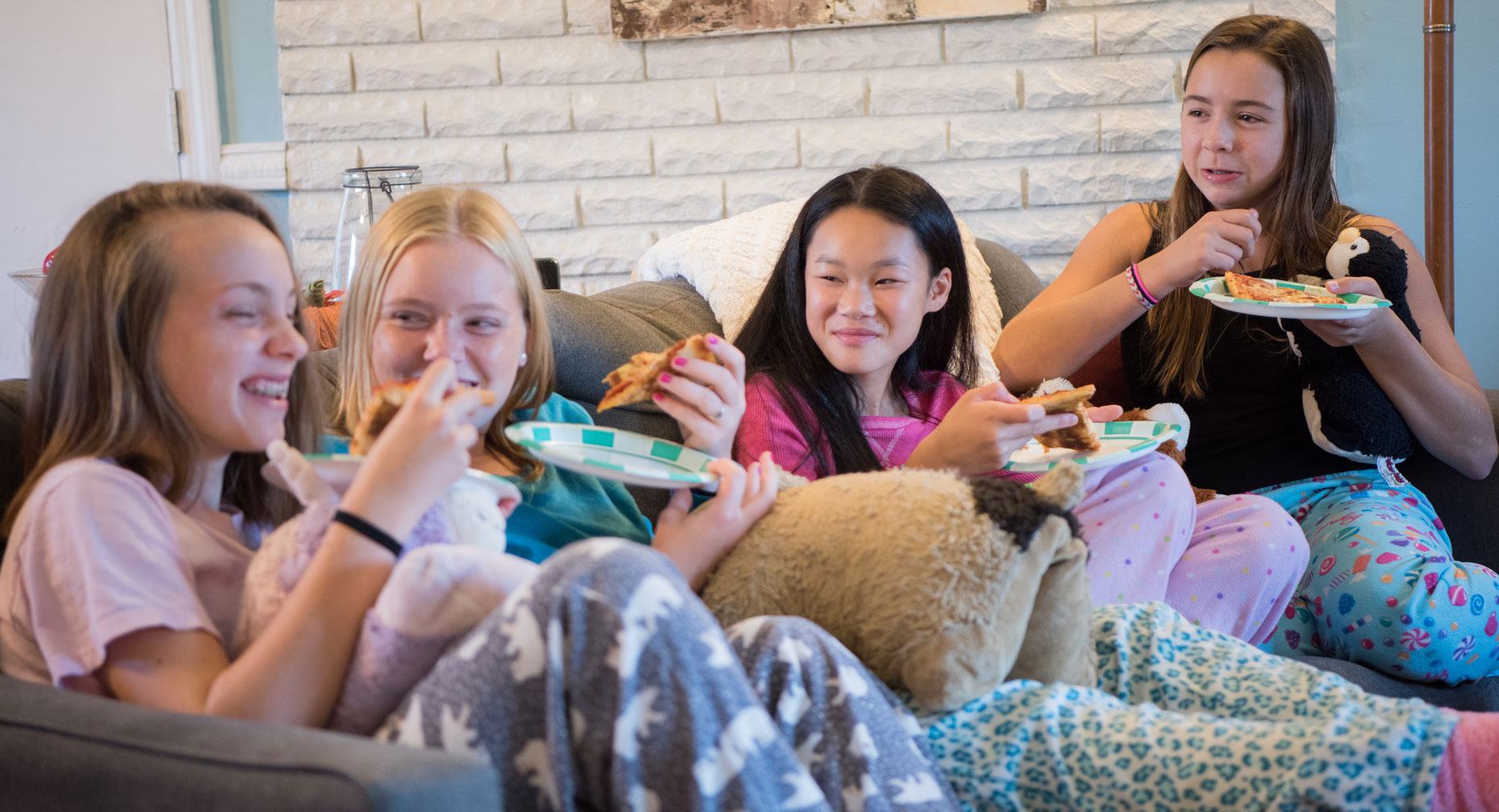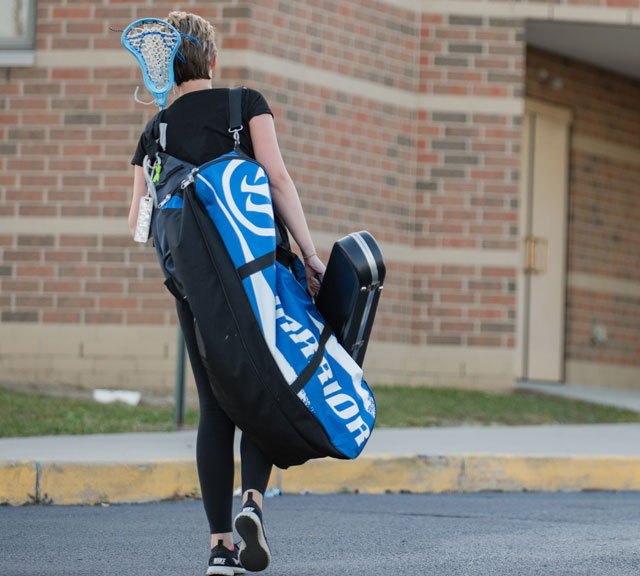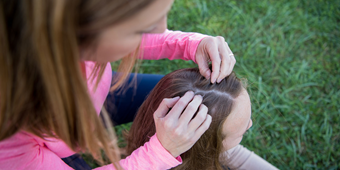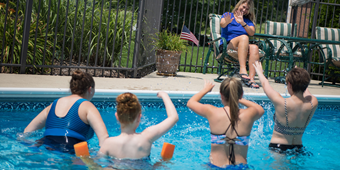Stress Relief for Kids: What You Can Do

Find Your Perfect Match
Answer a few questions and we'll provide you with a list of primary care providers that best fit your needs.
As a parent, you know all about stress. Your children feel and experience stress too — and they need your help to deal with it in healthy ways.
When kids are juggling schoolwork, sports, extracurricular activities, music lessons and any other number of time commitments, they can become overwhelmed.
And if changes are taking place at home that will force your child to adapt to a new situation — such as a move to a new house or a new sibling — life can feel hard to manage.
You can teach your child coping skills in simple ways, says Beth Esposito, MS, LPCC-S, LSW, Samaritan Behavioral Health. It’s also important for parents to get a handle on their own stress.
“If we want kids to manage stress, then we as parents need to model that for them,” says Esposito.
Signs of Stress
The first step toward helping your children deal with stress is to recognize when certain situations are having a negative effect on them. How do you know if your child is stressed out? You may notice subtle or obvious changes in their behavior, Esposito says.
Children can show physical and emotional symptoms in response to stress, including:
- Changes in eating habits
- Upset stomach
- Headache
- Nightmares
- Trouble sleeping
- Bedwetting
- Anxiety and worry
- Inability to relax
- Not taking part in favorite activities
- New fears
- Anger and crying
- Trouble controlling emotions
- Aggressive or stubborn behavior
Ask your child what’s going on, but be careful to phrase the questions in a way that is not shaming, says Esposito.
“Do not frame questions with a ‘Why,’ because asking why shifts blame to the child,” she says.
How Parents Can Help
You can educate your children to deal with stress by being a role model. Esposito encourages parents to do their best to keep their own stress under control and manage it in healthy ways.
The home environment and how you talk with and interact with your child also makes a difference, Esposito says. Try following these tips:
- Stay calm and spend relaxing time with your children.
- Create an organized, safe and secure home environment.
- Keep the lines of communication open.
- Get regular physical activity (a walk, tossing a baseball) to ease stress.
- Family routines, like a movie night or dinner together, can provide comfort and relieve or prevent stress.
- Talk with your child about coming changes, such as with jobs or a move.
- Listen to your child without trying to solve their problem and without being critical.
- Work with your child to help them understand and solve what is upsetting to them.
- Build your child's feelings of self-worth through encouragement, affection and rewards.
- Try to involve your child in activities where they can succeed.
- Give children the chance to make decisions about events in their lives. A sense of control can improve a child’s response to stress.
- Help your child learn from mistakes and failures.
- Monitor the TV shows, books and games your child consumes to avoid violence or upsetting content, especially right before bedtime.
You can educate your children to deal with stress by being a role model.
Strategies for Children
As children get older, they can begin to recognize when stress is taking a toll. Children as young as 8 can be taught to listen to their bodies and take steps to reduce stress, including:
- Make time to relax, alone or with friends.
- Talk with a trusted adult if there is too much on their plate.
- Make sure they get enough sleep.
- Listen to music. When children respond to music in a positive way it can help to level out the body’s circadian rhythm and improve sleep.
- Take time to breathe.
“Teaching someone to breathe when they are stressed sounds simple and silly but it can really work,” says Esposito. “Smaller children may not realize that they hold their breath when they are anxious.”
Esposito suggests this calming breath exercise:
- Breathe in through the nose
- Hold your breath for a count of 5
- Exhale through the mouth for a count of 5
“This really does change your body chemistry and help your brain believe that you can cope — and you can,” Esposito says.
Another coping strategy you can try is teaching your child to sit down when he feels anxious, instead of standing up. Not moving decreases energy in the body, which can be helpful, especially if a child is revving up for a panic attack.
The Importance of Family Time
Your entire family can work together to create a less stressful household. Esposito says research shows that even small moments of togetherness and face-to-face time with loved ones brings lots of benefits.
Some ideas include:
- A family bike ride, walk or hike
- A family dinner a few nights a week
- Watching a TV show or movie together
- Taking a family trip or going on an outing together
- Setting the same time every day when all devices or smartphones go on their chargers and stick to it
- Adding a family pet (when managed correctly)
“Family bonding time or the shared responsibility of caring for a pet increases the positive vibes in a household and decreases overall feelings of stress and anxiety,” Esposito says.
Let Your Child Be In Control

Children – and even adults – feel in control if they sense there is someone who understands them.
Sometimes, your child may find this sense of comfort apart from you, with a grandparent, an aunt or uncle or another trusted adult. While it may be difficult, Esposito says parents should allow their child to foster that relationship so that they have a go-to person and a sense of belonging.
“The best thing any child can have growing up – and to be able to manage themselves and their stress – is that they identify and belong to a family and a team,” Esposito says.”
That sense of belonging can also come from a group of friends. Older children and adolescents need time to hang out with people who let them be themselves, where they can flat-out laugh and let loose. Such times are “helpful for a child to deal with the stress on their own,” Esposito says.
When to See a Doctor
Sometimes your child may need additional help from a doctor to better deal with stress. A general guideline to follow, Esposito says, is if your child is not functioning at her normal baseline and the changes have lasted for more than two weeks.
It’s time to call your pediatrician when your child:
- Shows major changes in physical or emotional behavior
- Is becoming withdrawn, depressed or more unhappy
- Is not functioning in major life areas such as school or their usual social circles
- Cannot control his behavior or anger
“As a parent, it’s not always easy to ask for outside help, but it doesn’t mean you are a bad parent,” Esposito says. “So many times as parents we are faced with things we didn’t dream we would be dealing with.”
Meeting and talking with a doctor or counselor can help you and your child find the strength to deal with whatever is causing the stress and give your family the tools you need to manage stress when similar situations.
Find Your Perfect Match
Answer a few questions and we'll provide you with a list of primary care providers that best fit your needs.
Source: PsychCentral.com; Medline Plus; Beth Esposito, MS, LPCC-S, LSW; Samaritan Behavioral Health





